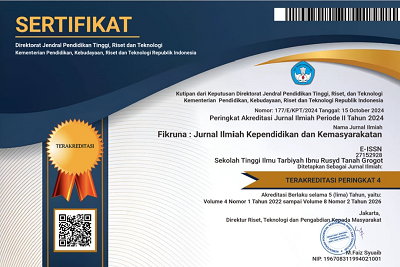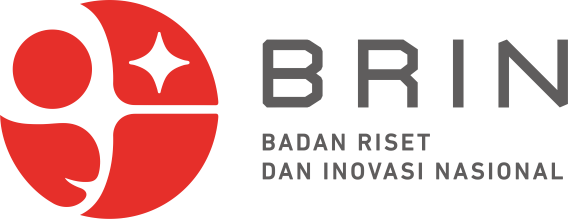THE INFLUENCE OF ISLAMIC LEADERSHIP ON MOTIVATION AND PERFORMANCE OF EMPLOYEES IN ISLAMIC BANKS IN EAST KALIMANTAN PROVINCE
Abstract
The purpose of this study is to prove and analyze the influence of Islamic leadership on hafizun at Islamic banks in East Kalimantan Province and to prove and analyze the influence of Islamic leadership on al-Kasbu at Islamic banks in East Kalimantan Province. This study employs a quantitative and qualitative approach, which is useful for describing the existence and role of a research object or variable in relation to other research variables in a descriptive manner, by conducting a statistical analysis of the causal relationship between the research variables. The results of this study are that Ri'asatul Islam has a significant positive influence on Hafizun, meaning that the better the application of Islamic values in Islamic leadership at Islamic banks in East Kalimantan Province, with indicators of honesty, responsibility, professionalism, wisdom, fairness, monotheism, gentleness, and noble character, the higher the Hafizun with indicators of beneficial, fortunate, seeking wealth through worship, working with the heart, seeking Allah's pleasure, inner peace, living for the Hereafter, and being righteous. This is proven by the increasing values of all Islamic leadership indicators, where the graphical trend has been increasing over the past five years, starting from 2008 to 2012. Ri'asatul Islam has a significant positive influence on al-Kasbu, where the better the application of Islamic values in Islamic leadership at Islamic Banks in East Kalimantan Province, the higher the al-kasbu of employees will be, thereby improving the spiritual performance of employees with the following indicators: performance, speed/accuracy, service, quality of work, increased Zakat, Infaq, and Shadaqah (ZIS) contributions, increased sunnah worship, discipline, and efficiency. This is evidenced by the increasing values of all Islamic leadership indicators, with a rising trend over the past five years, from 2008 to 2012.
References
Arikunto, S. 1998. Prosedur Penelitian Suatu Pendekatan Praktek. PT. Rineka. Cipta. Jakarta. Budi Santoso, Purbayu. 2005.
Baron, R.M. and Kenny, D.A. (1986). The moderator-mediator variable distinction in social psychological research: Conceptual, strategic, and statistical considerations. Journal of Personality and Social Psychology. 51(6): 1173-1182.
Bass, B. M., 1960. Leadership, Psychology and Organizational Behavior. New York: Harper and Brothers
Bass, B.M. and Avolio, B.J., 1994, Improving Organizational Effectiveness through Transformational Leadership, Sage, Thousand Oaks.
Blackorby, C., and Donaldson D., 1987. Welfare Rations and Distributionally Sensitive Cost-Benefit Analysis. Journal of Public Economics.
Blanchflower, D.G., Oswald, A.J., and Sanfey P., 1996. Wages, �Profits, and Rent Sharing�. The Quarterly Journal of Economics. Vol CXI, No.1
Burns, P M and Holden,A.1995. Tourism: a New Perspective, Prestice Hall International (UK) Limited, Hemel Hempstead.
Carbonell, AF., 2002. Subjective Questions to Measure Welfare and Well-Being. Discussion paper. Tinbergen Institute. Amsterdam.
Dessler, G. 1988, Managing Organizations in An Era Change, The Dryden Press.
Ferdinand, Augusty T, 2000, Strategy Pathways Toward Sustainable Competitive Advantage; Soutern Cross, Lismore, Australia, Unpublished DBA Tesis.
Fletcher, R. 1999. Ramie: The Different Bast Fibre Crop. Australian New Crops Newsletter. http://www.newcrops.uq.edu.au/newslett
Fiedler, Fred E. and Charmer, Martin M. 1974. Leadership and Effective Management. Glenview Illionis: Scott, Foresman and Company.
Harris, Lynette., 2002. Achieving a Balance in Human Resourcing between Employee Rights and Care for the Individual. Business and Professional Ethic Journal, 21(2), 45-60.
Hasibuan, Malayu, 1997. Manajemen Sumber Daya Manusia, Jakarta: Gunung Agung.
Islam, I., and Nazara, 2000. Estimating Employment Elasticity for the Indonesian Economy, Technical Note on the Indonesian Labour Market. International Labour Office
Khayyath, Yusuf dan Mir�astily Nadin, 1988. �Al-Mudhatalihat al-Ilmiyah wa al-Fanniyyah,� dalam Lis?n al-Arab al-Muhith, karya Ibnu Mandzur. Lebanon: D?r Lis?n al-�Arab
Koontz, Harold, O�Donnell, Cyril & Weihrich, Heinz. 1986. Manajemen. Jilid 2. Terjemahan: Gunawan Hutauruk. Jakarta: Penerbit Erlangga
Prabowo, 2005. �Analisis Kinerja Perusahaan Publik Bidang Industri Kertas & Pulp Dengan Konsep �Economic Value Added� Studi Kasus: PT Indah Kiat Pulp & Papers, Proceeding Forum Komunikasi Penelitian Manajemen di Indonesia 1995, Studio Manajemen Jurusan Teknik Industri ITB
Pugel,T.A.1980. Profitability Concentration and The Interindustry Variation in Wages The Review of Economics and Statistics Vol. 62 No2: 248-253.
Purwanto, Heri, 1998. Pengantar Perilaku Manusia untuk Keperawatan. EGC. Jakarta
Rahardjo, Dawam, 2002. Sejarah Ekonomi Islam, The International Institute of Islamic Thought, Jakarta, Indonesia
Rahman, Yahia Abdul. 1999, Islamic Instruments for Managing Liquidity, International Journal of Islamic Financial Services, Volume 1, Number 1, Apr-Jun
Ravallion, M. and Lokshin, M. .2000. Subjective Economic Welfare, Development Research Group, World Bank
Robertson, P. J., Roberts, D. R., dan Porras, J. I., �Dynamics of Planned Organizational Change: Assessing Empirical Support for a Theoretical Model,� Academy of Management Journal (Juni 1993).
Sholeh, Maimun. 1985. Permintaan dan Penawaran Tenaga Kerja serta Upah : Teori serta Beberapa Potretnya di Indonesia. http://staf.uny.ac.id
Salamah, 'Abd al-Rahim bin. 1987. Al-Siyasat al-Maliyah fi'l Islam al-Manhal 48 (No. 407)
Stiglitz, J.E. 1974. Alternative Theories of Wage Determination and Unemploymentin LDCS The Labor Turnover Model Quarterly Journal of Economics Vol 88:194-227
Stogdill, R.M. (1974), Handbook of Leadership, A Survey of Theory and Research. New York: The Free Press. 35. Sulistyani, A.T. (2004) Memahami Good
Stoner, Jamer A.F. and Sindoro, A. 1996. Manajemen. Jakarta: Prenhallindo
Suardi, R., 2003. Sistem Manajemen Mutu ISI 9000:2000, Penerapannya untuk Mencapi TQM. PPM. Jakarat
Sugiyono. 2001. Statistik Nonparametrik untuk Penelitian. Bandung: Alfabeta.
Yukl, Garry. 1994. Kepemimpinan dalam Organisasi, , terj. Jusuf Udaya, Prehalindo, Jakarta,
Zadjuli, Suroso Imam, 1999. Prinsip-prinsip Ekonomi Islam , Surabaya: FE Univwesitas Airlangga
Copyright (c) 2025 Maria Wati

This work is licensed under a Creative Commons Attribution-NonCommercial 4.0 International License.



.png)












